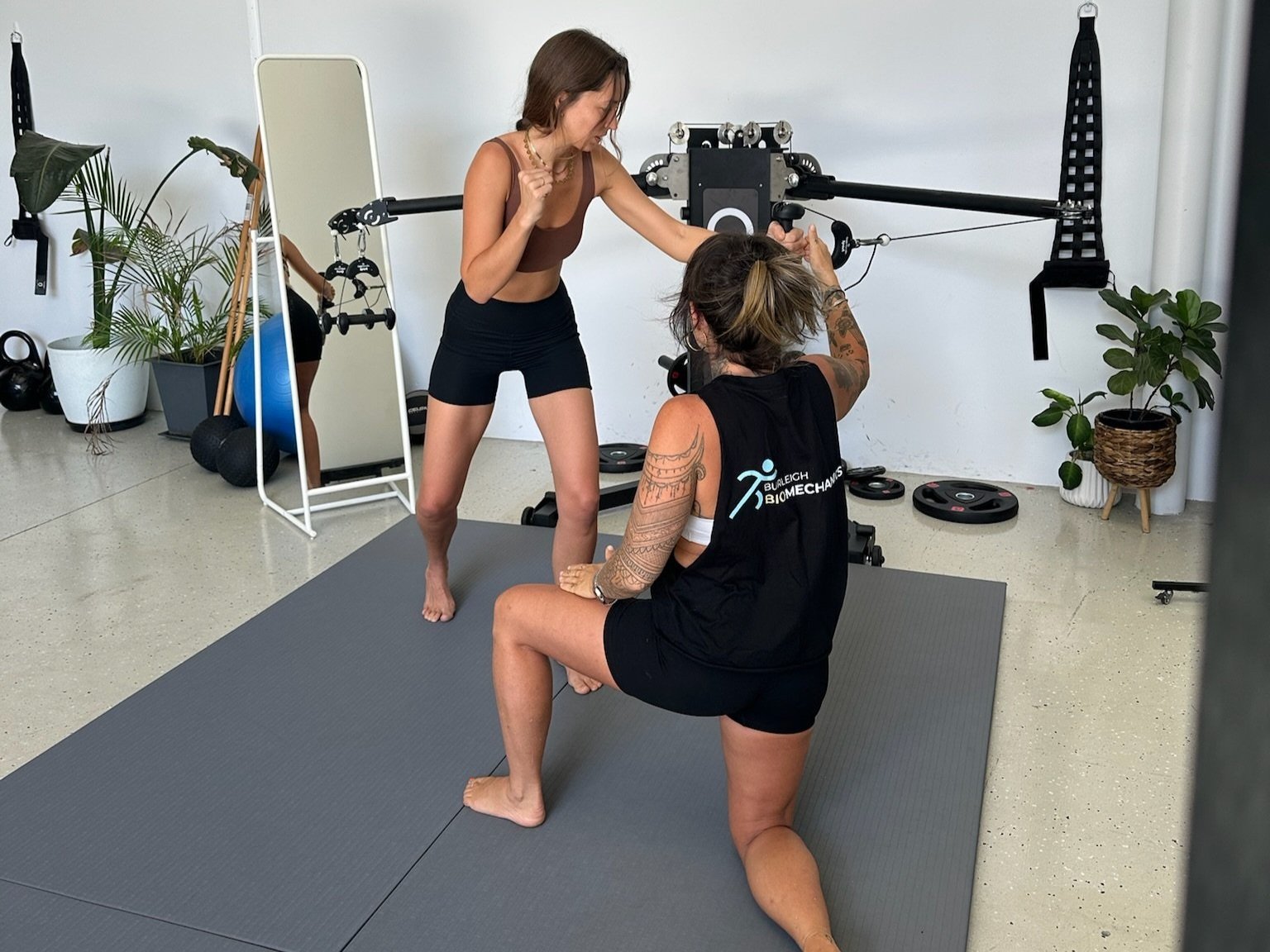Sick Of Waking Up With a Sore Back?
Here's Why It Happens, and What to Do About It
At Burleigh Biomechanics, we see this question constantly: "Why does my back hurt when I wake up?" You go to bed feeling relatively fine, but wake up stiff, aching, and frustrated. As the day goes on, the pain often eases. So why does it show up in the first place?
Let us break it down from a Functional Patterns lens.
Your Sleeping Posture Isn’t the Root Problem
Yes, there are better and worse ways to sleep (we'll get into that). But for most people waking up with sore back pain, the problem didn’t start in bed.
It started during the day.
Throughout your waking hours, the way you sit, stand, walk, train (or don’t train) creates compressive forces through your spine. These patterns accumulate, often without pain at first, and then express themselves when you're finally still.
Sleep doesn't just rest your muscles. It exposes postural dysfunctions. When you lie down, your body isn’t actively compensating anymore. That means:
The twisted pelvis from sitting slumped
The anterior tilt from weak glutes
The ribcage collapse from poor breathing
...these structural imbalances show up. And they put pressure on the spine, hips, and lower back tissues, leading to that familiar "back hurts after sleeping" feeling. For many, that results in a sore back after sleeping or even a bad back after sleeping.
Why Your Back Hurts When You Wake Up (But Feels Better Later)
This is key: pain that eases throughout the day is often mechanical in nature. That means it comes from how your body is stacked, not necessarily from injury.
Waking up with a sore lower back, or waking up with lower back pain, is often the result of:
Compressed discs due to poor posture
Tight hip flexors and QLs from sitting all day
A twisted pelvis putting torque into your lumbar spine
Once you get up and start moving, your nervous system re-engages, blood flow increases, and your compensatory patterns kick back in to mask the problem. That’s why it’s so common to feel back pain after sleeping on back, or back pain when lying down, but not as much during daily tasks.
You might ask, why does my back ache when I lie down? or why do my back hurt when I lay down? The answer is simple: you’re not offloading the structural stress caused by your movement habits. Instead, you’re decompressing into dysfunction.
So How Should You Sleep With Lower Back Pain?
While it won't fix the problem, choosing a better sleeping posture can help reduce the pressure on your spine overnight:
Side sleepers: Sleep with a pillow between your knees to keep your pelvis aligned.
Back sleepers: Place a small pillow under your knees to reduce lumbar extension.
Stomach sleepers: Try to transition out of this position — it puts excessive strain on your lumbar spine. Many people complain, "when I lay on my stomach my back hurts" — and now you know why.
Also consider:
A medium firm mattress that supports spinal neutrality
A thin pillow if sleeping on your back to avoid forward head posture
If you're wondering how to sleep on back with lower back pain, or sore lower back best way to sleep, the truth is there's no perfect position unless the body itself is aligned. But these tips can help reduce strain.
And if you're Googling how to lie down with lower back pain or how to lay down with lower back pain, the goal should be to support a spine that is stacked and not twisted — easier said than done without retraining your body mechanics.
Why Functional Patterns Training Makes the Difference
Traditional advice focuses on sleeping positions, stretching, and rest. But if your spine is misaligned due to years of poor movement, you’ll keep waking up with sore lower back pain no matter how many pillows you use.
At Burleigh Biomechanics, we assess your:
Pelvic tilt
Ribcage positioning
Gait mechanics
Tension chains from feet to skull
Then we use Functional Patterns training to reprogram how you move, stand, and load your joints.
When we improve your postural mechanics during the day, you stop building up pressure that gets exposed at night. Over time, this means:
No more back hurts after waking up complaints
No more back pain after sleeping episodes
No more wondering how can I sleep with back pain or how to sleep with sore lower back
Just pain-free mornings that carry into pain-free days.
Key Conditions We Address
If you have a diagnosis like spinal stenosis, degenerative disc disease, or are dealing with chronic back tightness, our method helps reduce mechanical stress without invasive treatments. Instead of managing symptoms, we address the cause through intelligent movement.
Even in cases of back ache after sleeping or back pain when I lay down, realignment through proper training has proven more effective than temporary solutions.
Final Thoughts: Don’t Just Change How You Sleep. Change How You Move.
If you're constantly wondering how to sleep with lower back strain, or how can I sleep with lower back pain, it's time to zoom out.
Sleeping posture matters. But the only lasting pain relief comes from fixing your movement patterns. That’s what we do at Burleigh Biomechanics.
If you’ve been asking why does my back hurt when I wake up or how to relieve back pain after waking up, you’re not alone. But relief comes from working with the body, not against it.



